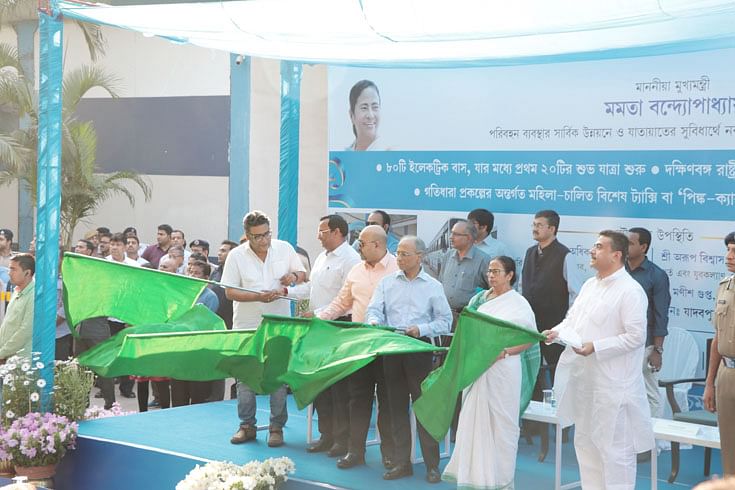Tata Motors to supply 80 electric buses to West Bengal Transport Corporation
While 20 Ultra Electric 9/9m AC E-buses have already been delivered, 20 more will be by March 31, followed by 40 9/12m AC E-buses in a phased manner.
Tata Motors has announced the supply of 80 electric buses to the West Bengal Transport Corporation (WBTC). The company has already supplied 20 Ultra Electric 9/9m AC E-buses, with 20 more to be delivered by March 31, 2019. The company will also be supplying 40 9/12m AC E-buses to WBTC in a phased manner.
The Chief Minister of West Bengal Mamata Banerjee, flagged off the buses with dignitaries from WBTC and Tata Motors. The new buses will begin their inaugural journey from Nabanna, Howrah.
Chief minister Mamta Banerjee flags off Tata Motors' first electric bus in Kolkata.
Speaking on the occasion, Rohit Srivastava, Product Line Head – Passenger Commercial Vehicles, Tata Motors, said, “With growing environmental concerns, the electric bus is definitely a symbol of future mobility. Tata Motors has always been at the forefront of the E-mobility evolution and this order is a testament of our best-in-class solution tailored for the bus segment in India. The order is part of the 255 e-buses to be supplied to six STUs in the country, of which WBTC is one.”
Manufactured at Tata Motors Dharwad plant, the Ultra Electric buses will have a traveling range of up to 150 kilometres on a single charge. The company has installed charging stations at Nonapukur, Kasba, Newtown and Belghoria. Furthermore, intermediate charging terminals powered with fast charging are mounted at Howrah and Santragachi. The Li-ion batteries have been placed on the rooftop to prevent breakdown due to waterlogging. The batteries are liquid cooled to maintain the temperature within an optimum range and ensure longer life along with better performance in tropical conditions.
Dr. A.K. Jindal, Head Engineering (Electric & Defence), CVBU, Tata Motors said, “Tata Motors has been engaging in advanced engineering and development of electric traction system for Hybrid as well as Pure Electric vehicles for over a decade. The Ultra Electric Bus is a new modular platform, which has been developed in a very short lead-time of less than a year, leveraging the knowledge and experience we have gained and demonstrating our commitment to the Government of India’s National Electric Mobility Mission Plan for Public Transport. The architecture of the platform has been conceived and developed by the in-house engineering team of Tata Motors, meeting the requirement of various tenders floated by different state transport undertakings. The exterior has been designed with new brand identity that includes stylized Ultra headlamps and streamlined looks. The vehicle architecture ensures very low energy consumption and low TCO (total cost of operation) apart from being a Zero Emission environment friendly bus.”
Ultra electric buses
The Ultra electric buses, powered by an Integrated Electric Motor Generator, are built on existing proven platforms of Starbus and Ultra. With a max power of 245KW and continuous power of 145KW, the buses have a seating capacity of 31 people and a driver.
The buses will help in zero tailpipe emissions, 50% lower fuel costs, 20% better energy consumption and lower maintenance downtime as compared to diesel buses. The Ultra Electric buses are air-conditioned, have modern interiors and comfortable seats for 31 passengers.
As an industry first, there will be air suspension for both front and rear axles to make travel more comfortable for the commuters. Integrated electric motor generator with a peak power of 333hp can deliver 197hp continuously ensuring effortless driving in congested roads and frequent start stops needing no shifting of gears.
According to Narayan Swaroop Nigam, managing director, West Bengal Transport Corporation (WBTC), “As one of the most densely populated cities in the country, Kolkata is a challenge for us. However with our strong commitment to transform Kolkata as one of the smartest cities in the world, public transport has always been a key focus area of our government. The state-of-the-art Ultra 9m AC Electric buses by Tata Motors are a big step towards achieving better public transport, with a clear emphasis on providing sustainable, affordable and safe mobility solutions for the masses. These E-buses will soon ply on the roads of West Bengal, from Howrah to Jadavpur, Garia to Airport, Behala to Rajarhat and Esplanade to Santragachi. We look forward to strengthening this association with Tata Motors to bring smart city solutions for a greener and cleaner Kolkata.”
The critical electrical traction components have been sourced from internationally known best-in-class suppliers in USA, Germany and China offering proven products. The buses have been tested and validated by Tata Motors across states including Himachal Pradesh, Chandigarh, Assam and Maharashtra to establish performance in diverse terrains.
The company has tenders to supply 255 electric buses to six public transport undertakings including WBTC (West Bengal), LCTSL (Lucknow), AICTSL (Indore), ASTC (Guwahati), J&KSRTC (Jammu) and JCTSL (Jaipur). In addition to this, the company is also working on developing its electric mini-bus segment in the near future.

RELATED ARTICLES
Cosmo First diversifies into paint protection film and ceramic coatings
The Aurangabad, Maharashtra-based packaging materials supplier is leveraging its competencies in plastic films and speci...
JSW MG Motor India confident of selling 1,000 M9 electric MPVs in first year
The 5.2-metre-long, seven-seater luxury electric MPV, which will be locally assembled at the Halol plant in Gujarat, wil...
Modern Automotives targets 25% CAGR in forged components by FY2031, diversifies into e-3Ws
The Tier-1 component supplier of forged components such as connecting rods, crankshafts, tie-rods, and fork bridges to l...






 By Autocar Professional Bureau
By Autocar Professional Bureau
 20 Feb 2019
20 Feb 2019
 16671 Views
16671 Views













